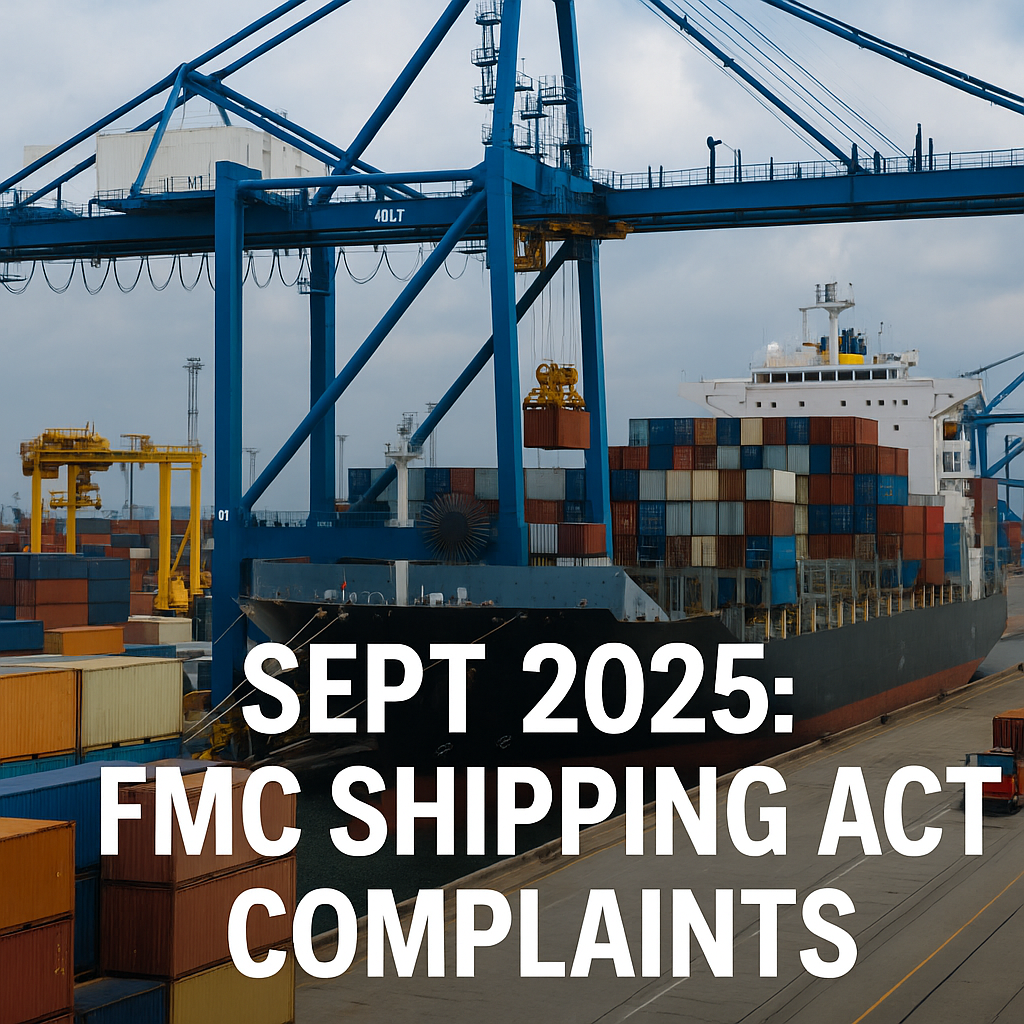In early September 2025, the U.S. Federal Maritime Commission (FMC) entered the headlines again—with the arrival of three formal complaints under the U.S. Shipping Act alleging unreasonable shipment handling practices. Distribution-Publications, Inc.
While regulatory tension is nothing new in maritime logistics, these filings mark a fresh spotlight on port-to-consignee operations, handling protocols, and enforcement posture. For carriers, NVOCCs, forwarders, and terminal operators, “FMC shipping act complaints September 2025” is a phrase to take seriously.
Let’s unpack why it matters, what the cases tell us, and how the industry should respond.
The Complaints & Allegations — What We Know
The three new complaints, filed in August but public by early September, center on unreasonable handling practices, a long-standing FMC concern.
- FMC Docket No. 25-15: Worldwide Nexus Logistics, LLC (Florida) vs. Wallenius Wilhelmsen
- FMC Docket No. 25-16: IWG International Wood Group (SC) & Honest Trading Int’l (GA) vs. DB Schenker USA, Inc.
The complaints allege that carriers or NVOCCs imposed unfair charges, failed to meet contract terms, or applied handling practices inconsistent with the “reasonable and just” standard required under the Shipping Act.
These types of actions often implicate:
- Container demurrage or detention
- Improper billing or surcharges
- Unjust gate fees or switching charges
- Unfair container handling or terminal practices
Although not yet resolved, these new dockets raise red flags that FMC is reactivating oversight in the operational margins of the supply chain.
Why This Matters for Maritime Operators
Regulatory & Legal Risk
Filing a complaint means formal scrutiny—investigations, document requests, hearings, and possible penalties. Even absent fines, reputational damage and legal exposure can be substantial.
Contractual & Commercial Impact
Shippers and forwarders will re-examine logistics contracts, pushing for more transparency and protections. Operators may need to renegotiate terms or absorb stricter compliance oversight.
Operational Strain
To defend or avoid allegations, companies may need to audit handling practices, gate fees, container turnaround metrics, and data records. Some processes may need redesign or automation to reduce dispute risk.
Precedent & Signaling
FMC’s decision to open new dockets suggests the Commission is signaling a stricter era. Operators should interpret this as a warning: the scrutiny zone is expanding beyond just large carriers.
Recommended Response & Strategy
Operators (carriers, NVOCCs, terminals, forwarders) should act proactively:
- Audit billing & handling practices
- Review demurrage, detention, handling surcharges, and fees to ensure justifications, transparency, and alignment with contracts.
- Improve recordkeeping & documentation
- Maintain logs of container moves, gate operations, switch fees, terminal handling, and communication records.
- Contract clarity & dispute management
- Tighten contract clauses around handling, dispute resolution, defined unreasonable practices, audit rights.
- Engage experts
- Legal and compliance advisors with maritime specialization can help interpret FMC expectations, past precedent, and defense strategy.
- Monitor docket developments & FMC signals
- Follow FIR filings, FMC orders, past dispositions to anticipate trends.
Conclusion
The FMC shipping act complaints in September 2025 mark a return of regulatory heat to the details of maritime logistics practices. For operators across the chain—carriers, forwarders, terminal operators—this is a moment to clean house, tighten contracts, and prepare defenses.
Regulatory oversight is less about scale and more about subtle margins now. Don’t wait for a complaint—act before you get one.
Need help assessing your risk exposure or optimizing your handling & billing practices? Contact The Saturn Partners for maritime-focused compliance audits, contract reviews, and proactive defense strategies.

